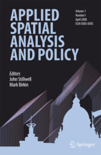
Applied Spatial Analysis and Policy
Scope & Guideline
Transforming data into actionable policy solutions.
Introduction
Aims and Scopes
- Spatial Analysis Methodologies:
The journal covers a wide range of spatial analysis techniques, including geostatistics, spatial econometrics, and GIS-based methods, to analyze and visualize spatial phenomena. - Urban and Regional Planning:
Research often focuses on urban development, land use, and regional planning, addressing the spatial dynamics of cities and their surrounding areas. - Environmental Policy and Management:
Papers frequently explore the intersection of spatial analysis and environmental issues, such as climate change, pollution, and resource management, offering insights for sustainable practices. - Health and Social Policy:
The journal examines the spatial dimensions of public health and social inequalities, emphasizing how geographic factors influence health outcomes and access to services. - Economic Development:
Research includes studies on economic patterns, industrial clustering, and the spatial distribution of resources, contributing to understanding regional economic dynamics. - Transportation and Mobility:
The journal investigates the spatial aspects of transportation systems, including accessibility, public transit, and the impact of infrastructure on mobility patterns. - Community Engagement and Participation:
Research often highlights the role of community input in spatial planning processes, utilizing participatory GIS and public engagement methodologies.
Trending and Emerging
- COVID-19 Impact Studies:
Research examining the spatial impacts of the COVID-19 pandemic, including analyses of urban decline, public health access, and economic recovery, has surged, reflecting the pandemic's profound effects on spatial dynamics. - Climate Change and Environmental Justice:
There is an increasing emphasis on studies that explore the spatial dimensions of climate change and environmental justice, particularly how these issues affect vulnerable populations. - Data-Driven Decision Making:
The integration of big data and advanced analytics in spatial decision-making processes is a growing theme, highlighting the importance of data in informing policy and planning. - Smart Cities and Urban Technology:
Research focusing on smart city initiatives, urban technology, and their spatial implications is gaining traction as cities adopt innovative approaches to urban challenges. - Health Disparities and Accessibility:
Papers addressing spatial health disparities, particularly related to access to healthcare services and the impact of geographic factors on health outcomes, are increasingly prevalent. - Participatory Spatial Planning:
There is a rising interest in participatory planning approaches that involve community engagement and stakeholder input in spatial decision-making processes. - Mobility and Transportation Networks:
Emerging studies are focusing on the spatial analysis of transportation networks, accessibility, and their role in shaping urban mobility patterns.
Declining or Waning
- Traditional Land Use Planning:
There is a noticeable decline in papers focusing solely on traditional land use planning without the integration of advanced spatial analysis techniques, as the field shifts towards more dynamic and data-driven approaches. - Basic Geographic Information Systems (GIS) Applications:
Research that merely describes GIS applications without substantial analytical depth or policy implications is waning, indicating a move towards more complex and integrated spatial analyses. - Historical Spatial Analysis:
Fewer studies are being published that focus on historical spatial analysis alone, as the journal increasingly emphasizes contemporary applications and real-time data analysis. - Single-Factor Economic Analyses:
Papers that analyze economic factors in isolation, without considering the multi-faceted interactions of social, environmental, and spatial variables, are becoming less common. - Static Spatial Models:
The journal is moving away from static models that do not account for temporal changes, reflecting a growing preference for dynamic and adaptive modeling approaches.
Similar Journals
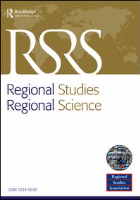
Regional Studies Regional Science
Illuminating the Complexities of Regional ScienceRegional Studies Regional Science is a pioneering journal published by Routledge Journals, Taylor & Francis Ltd, specializing in the interdisciplinary examination of regional dynamics and their effects on economic, social, and environmental landscapes. Established as an open-access journal since 2014, it ensures widespread dissemination of knowledge, promoting accessibility for researchers, professionals, and students alike. Based in the United Kingdom, this journal has garnered a notable reputation, holding a Category Quartile ranking of Q2 in 2023 across various fields, including Economics and Econometrics, Geography, Planning and Development, and Sociology and Political Science. Its rankings in the Scopus database reflect its growing influence within the social sciences, positioning it as a valuable resource for contemporary regional studies. With a commitment to high-quality research, Regional Studies Regional Science serves as a vital platform for the exchange of innovative ideas and empirical findings that address the pressing challenges faced by regions worldwide.

Journal of Settlements and Spatial Planning
Navigating the Intersection of Geography and DevelopmentThe Journal of Settlements and Spatial Planning, published by CLUJ UNIV PRESS, stands as a prominent platform dedicated to advancing research and discourse in the realms of geography, planning, and development. With an ISSN of 2069-3419 and an E-ISSN of 2248-2199, this journal has established itself since its inception in 2015, showcasing a rich array of scholarly articles that address critical issues related to spatial planning and settlement studies. As indicated by its Q3 category ranking in the 2023 Scopus database, the journal currently holds a respectable spot in the academic landscape, ranked #401 out of 821 within its field, reflecting its dedication to quality research and innovative methodologies. Researchers, professionals, and students will find valuable insights and evidence-based analyses that provoke thoughtful dialogue and inspire future studies. Operating out of Cluj Napoca, Romania, the journal caters to an international audience, emphasizing open access to a breadth of essential knowledge, thereby fostering collaboration and exploration within this vital domain of social sciences.

Journal of Geographical Systems
Advancing Geographic Scholarship for a Sustainable FutureJournal of Geographical Systems, published by SPRINGER HEIDELBERG, is a premier platform for disseminating cutting-edge research in the fields of geography, economics, and environmental science. With a strong emphasis on innovative methodologies and interdisciplinary approaches, this journal serves as an essential resource for scholars seeking to explore the complex interactions between human and physical systems in our ever-changing world. The journal’s impressive 2023 Q1 ranking in Geography, Planning and Development and substantial presence in Q2 categories for Earth-Surface Processes and Economics underscore its pivotal role in advancing geographic scholarship. Researchers can benefit from the journal's accessibility through various distribution channels, fostering an inclusive academic discourse. With a commitment to high-impact studies from 1999 to 2024, the Journal of Geographical Systems is a significant avenue for the exchange of ideas and findings that can influence policy and planning at both local and global scales.

Raumforschung und Raumordnung-Spatial Research and Planning
Transforming research into actionable spatial strategies.Raumforschung und Raumordnung - Spatial Research and Planning (ISSN: 0034-0111, E-ISSN: 1869-4179), published by OEKOM VERLAG GMBH, is a prominent scholarly journal based in Germany, focusing on critical issues in spatial research and planning. Established in 1977, this Open Access journal has been providing free access to its content since 1998, allowing researchers, professionals, and students to engage with high-quality studies exploring the intricacies of urban studies, environmental science, and geography. With a notable impact in its field, evidenced by its Q2 ranking in Urban Studies and Q3 rankings in Earth and Planetary Sciences, the journal plays a vital role in fostering interdisciplinary dialogue, advancing knowledge, and influencing policies across various spatial domains. It continues to evolve and adapt, having converged its years of publication effectively, making it a valuable resource for anyone looking to stay informed on the latest trends and research within the realms of spatial planning and environmental analysis.

TIJDSCHRIFT VOOR ECONOMISCHE EN SOCIALE GEOGRAFIE
Unveiling Contemporary Socio-Economic ChallengesTIJDSCHRIFT VOOR ECONOMISCHE EN SOCIALE GEOGRAFIE, an esteemed journal published by WILEY, provides a premier platform for the dissemination of cutting-edge research within the fields of economics and social geography. With an ISSN of 0040-747X and an E-ISSN of 1467-9663, this journal has established itself as a pivotal resource, exhibiting a remarkable Q1 ranking in both Economics and Econometrics as well as Geography, Planning and Development for 2023. Notably, it is positioned in the 95th percentile among 821 journals in its category of Social Sciences, and ranks 46th among 716 in Economics and Econometrics, underscoring its influential role in shaping academic discourse. The journal, which has been in publication since 1967 and is anticipated to run through 2024, invites contributions that explore the intricate interplay between economic phenomena and social geospatial dynamics. Researchers, professionals, and students are encouraged to engage with its findings, which are crucial for understanding contemporary socio-economic challenges and innovations on a global scale.
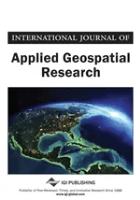
International Journal of Applied Geospatial Research
Unveiling the potential of geospatial applications for informed decision-making.International Journal of Applied Geospatial Research is an esteemed publication dedicated to advancing the field of geospatial research. Published by IGI Global, this journal provides a platform for innovative studies from 2010 to 2024 that encourage multidisciplinary contributions across Earth and planetary sciences and geography. While currently not offering open access, the journal's focus on applied research ensures that it remains highly relevant to both academics and industry professionals alike. With an ISSN of 1947-9654 and an E-ISSN of 1947-9662, it has been indexed in various databases, reflecting its emerging significance with rankings such as Q4 in Earth and Planetary Sciences and Geography according to Scopus, placing it at the intersection of critical research and practical application. Researchers, professionals, and students can expect insightful articles that enhance understanding and drive innovation in geospatial applications essential for informed decision-making in a rapidly changing world.
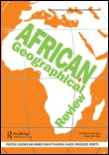
African Geographical Review
Exploring the Rich Tapestry of Africa's Geographical DynamicsAfrican Geographical Review is a pivotal academic journal published by Routledge Journals, Taylor & Francis Ltd, whose mission is to advance knowledge and understanding of geographical dynamics across the African continent. With an ISSN of 1937-6812 and an E-ISSN of 2163-2642, this journal consistently delivers high-quality research, showcasing innovative perspectives and interdisciplinary approaches within the fields of Earth-Surface Processes and Geography, Planning and Development. Recognized in 2023 with a Q2 ranking in these categories, it ranks #231 out of 821 in Social Sciences and #63 out of 179 in Earth and Planetary Sciences according to Scopus metrics, reflecting its substantial impact and relevance. Featuring research that spans various geographic themes, the journal not only champions academic inquiry but also fosters a deeper understanding of spatial and environmental challenges unique to Africa. Engaging with a diverse audience of researchers, professionals, and students, the African Geographical Review serves as an indispensable resource for those committed to enhancing geographic scholarship and informing sustainable development practices across the continent.
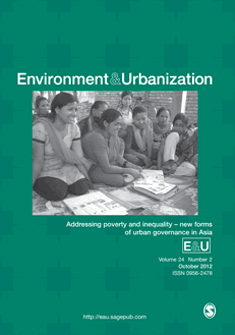
ENVIRONMENT AND URBANIZATION
Bridging urban studies and environmental science for impactful change.Environment and Urbanization is a leading interdisciplinary journal published by SAGE Publications Ltd, dedicated to advancing knowledge in the fields of Environmental Science and Urban Studies. With a strong focus on the interactions between urban environments and ecological systems, this journal has established itself as a pivotal resource for researchers, professionals, and students interested in sustainable urban development and environmental management. Since its inception in 1989, Environment and Urbanization has continually provided high-quality, peer-reviewed articles that foster a deeper understanding of contemporary urban challenges, making it a highly cited publication with an impressive impact factor. As evidenced by its Q1 ranking in both Environmental Science (miscellaneous) and Urban Studies for 2023, the journal stands at the forefront of research, boasting notable Scopus rankings in its fields. By remaining committed to publishing cutting-edge research, the journal aims to influence policy and practice across the globe, ultimately aiding in the creation of more resilient and livable urban areas.

Hrvatski Geografski Glasnik-Croatian Geographical Bulletin
Fostering Global Collaboration in Geographical ResearchHrvatski Geografski Glasnik-Croatian Geographical Bulletin, ISSN 1331-5854, E-ISSN 1848-6401, is an esteemed open-access journal published by the Croatian Geographical Society that has been serving the geography community since 1929. Based in Zagreb, Croatia, this journal focuses on a broad spectrum of geographical research, providing a platform for the dissemination of original articles, reviews, and case studies that contribute to the understanding of earth-surface processes and development planning. Although it currently holds Q4 rankings in both Earth-Surface Processes and Geography, Planning and Development, the journal is dedicated to enhancing its impact within the scientific community, aspiring to elevate research visibility and collaborative opportunities. With a commitment to open access, it ensures that all content is readily available to researchers, professionals, and students worldwide, fostering an inclusive environment for geographical scholarship. Engaging with this journal presents an opportunity to stay updated with emerging trends and pivotal studies within the discipline throughout its converged years from 1998 to 2024, making it a vital resource in geography and related fields.
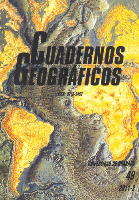
Cuadernos Geograficos
Illuminating the pathways of geographical inquiry since 1983.Cuadernos Geograficos is a distinguished open access journal published by UNIV GRANADA in Spain, dedicated to advancing the fields of geography, planning, and earth-surface processes. With an ISSN of 0210-5462 and E-ISSN 2340-0129, this journal has been serving as an essential platform for scholars since its inception in 1983. By providing rigorous peer-reviewed research, Cuadernos Geograficos contributes significantly to the academic discourse within these disciplines, holding a respectable position in the Q3 category for both Earth-Surface Processes and Geography, Planning, and Development as of 2023. The journal is indexed in Scopus, ranking #431/821 in Social Sciences and #100/179 in Earth and Planetary Sciences, affirming its relevance and impact within the scholarly community. With its commitment to open access since 1999, Cuadernos Geograficos ensures that vital research is accessible to a diverse audience of researchers, professionals, and students, fostering knowledge sharing and collaborative advancements in the geographical sciences.